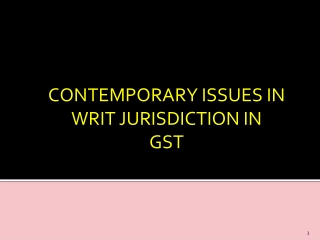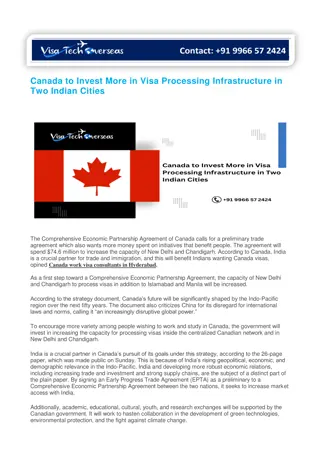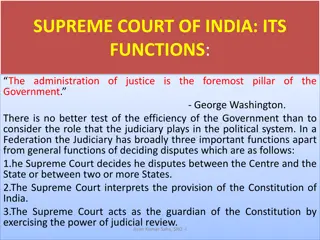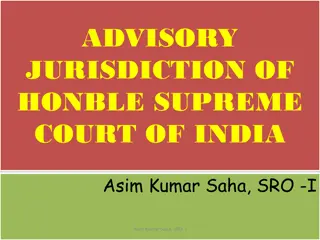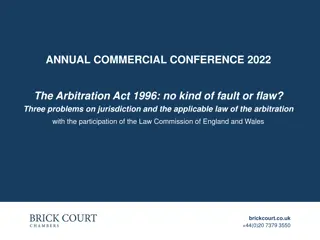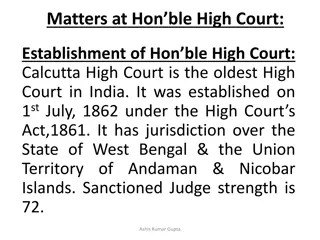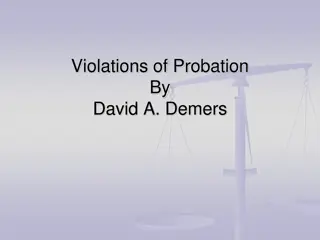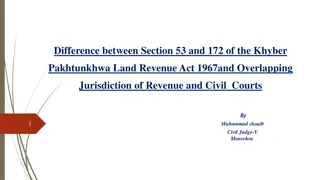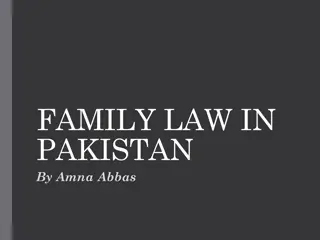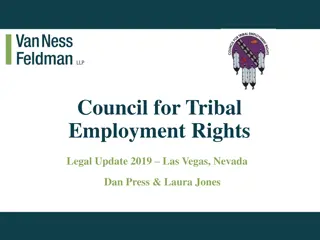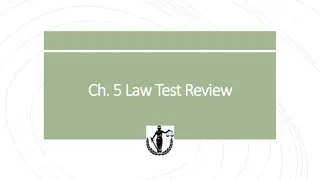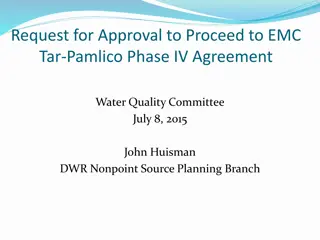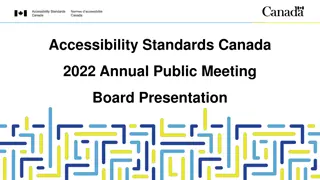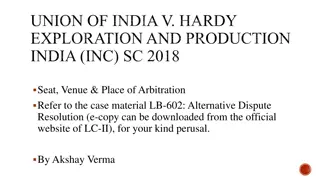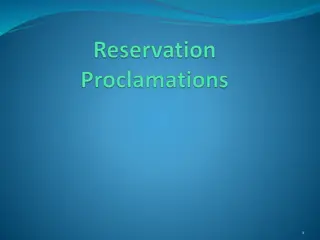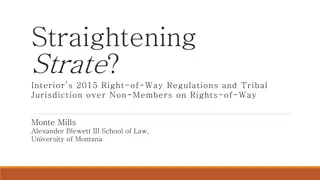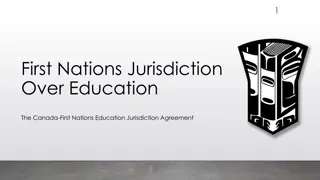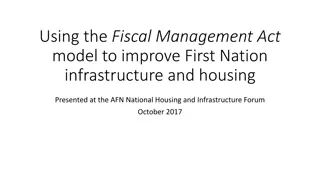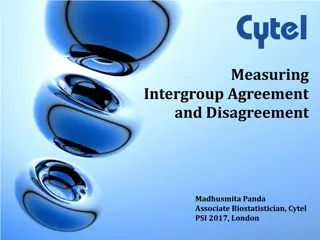Canada-First Nation Education Jurisdiction Funding Agreement Overview
Overview of the Canada-First Nation Education Jurisdiction Funding Agreement, including key agreements, funding structure, and approval processes between Canada and Participating First Nations. This presentation highlights the Sectoral Self-government Agreement and the role of Chief and Council in ratifying the Funding Agreement.
Download Presentation

Please find below an Image/Link to download the presentation.
The content on the website is provided AS IS for your information and personal use only. It may not be sold, licensed, or shared on other websites without obtaining consent from the author. Download presentation by click this link. If you encounter any issues during the download, it is possible that the publisher has removed the file from their server.
E N D
Presentation Transcript
1 First Nations Jurisdiction Over Education Canada-First Nation Education Jurisdiction Funding Agreement
2 Suggested Procedure for Discussion and Questions After each section there will be an allotted time for questions and discussion. If questions come up during the slides, please record them in the Zoom chat and they will be collected by the discussion moderators.
3 Presentation Overview 1. Brief Overview of Jurisdiction Agreements 2. Overview of The Canada-First Nation Education Jurisdiction Funding Agreement
4 Brief Overview of Jurisdiction Agreements 4
5 Overview of Jurisdiction Agreements First Nations, FNESC, Canada, BC, and FNEA have negotiated a number of agreements that support the effective implementation of the Jurisdiction Agreements between Canada and PFNs. The following slides provide a high level overview of the agreements among the various parties.
6 Overview of Key Jurisdiction Agreements First Nations Education Jurisdiction Framework Agreement (2023) Jurisdiction agreements with BC This Framework Agreement has two schedules: There are 3 agreements with BC: Canada - First Nation Education Jurisdiction Agreement Canada - First Nation Education Jurisdiction Funding Agreement BC FNEA Agreement BC - PFN Agreement BC - FNESC Agreement
7 Canada - First Nation Education Jurisdiction Agreement (Jurisdiction Agreement) Canada - First Nation Education Jurisdiction Funding Agreement (Funding Agreement) This is the Sectoral Self- government Agreement between Canada and individual PFNs. This funding agreement is intended to support the implementation of the Jurisdiction Agreement. It sets out how Canada will fund a PFN to meet its responsibilities under the Jurisdiction Agreement. It recognizes a PFN s law-making authority and sets out the parties responsibilities. The Funding Agreement must be approved by Chief and Council. The Jurisdiction Agreement must be ratified by a First Nation s community members.
8 Canada - First Nation Education Jurisdiction Funding Agreement (Funding Agreement) The parties to the Funding Agreement are: Canada, represented by the Minister of Crown-Indigenous Relations ( Canada ), and the Participating First Nation, represented by Chief and Council ( PFN ) A model Funding Agreement was finalized in May 2022 and four First Nations signed their own individual funding agreements based on the model. These agreements came into effect on July 1, 2022. The model Funding Agreement was updated in 2023 to provide greater clarity regarding the timing and way in which funding will flow to Participating First Nations. Three more First Nations signed individual agreements in 2023 based on the updated model, which came into effect on July 1, 2023.
Overview of The Canada- First Nation Education Jurisdiction Funding Agreement 9
10 Overview of the Funding Agreement The Funding Agreement is 16 pages long and has 6 Schedules attached to it which comprise an additional 15 pages (31 total). The Funding Agreement is made up of 10 parts: Part 1 Definitions Part 2 Term Part 3 Participating First Nation s Responsibilities Part 4 Canada s Commitments Part 5 Periodic Review and Collective Engagement
11 Overview of the Funding Agreement Cont. Part 6 Accountability Part 7 Information Exchange Part 8 Dispute Resolution Part 9 Default and Remedies Part 10 General Provisions
12 Whereas Provisions and Part 1 Definitions The whereas provisions situate the Funding Agreement in the context of the Canada-First Nation Education Jurisdiction Agreement ( Jurisdiction Agreement ), but are not legally binding. Part 1 contains the definitions relevant to the agreement.
13 Part 2 Term The term of the Funding Agreement starts on the Effective Date and may be terminated by agreement of the parties or through a process described in the agreement. A party that wishes to terminate the Funding Agreement must provide the other party with a notice of intent to terminate which: sets out the reasonable grounds for terminating the Funding Agreement, and a proposal to replace it that addresses the funding commitments in the Jurisdiction Agreement. If the other party does not accept with the termination and the proposal, the parties will engage in negotiations.
14 Part 2 Term Cont. If the negotiations are unsuccessful, the party that wishes to terminate the Funding Agreement must refer the matter for decision to: the Minister of Crown-Indigenous Relations (if Canada proposed the termination), or Chief and Council (if the PFN proposed the termination). The Minister or Chief and Council may direct that: the Agreement be terminated, or their officials seek to extend the negotiation period and return to negotiations. In the case of a termination proposed by Canada, there are opportunities for the First Nation to meet with and provide submissions to the Minister. Note: The process is described in more detail in the attached chart.
15 Part 3 Participating First Nation s Responsibilities The PFN is responsible for providing, or paying for, education in accordance with its obligations under the Jurisdiction Agreement. Under the Jurisdiction Agreement, the PFN agrees to provide kindergarten to grade 12 education to eligible students attending the PFN s school(s). The PFN will also pay for the education of eligible students who are: enrolled in a public school, an independent school, or a school operated by or on behalf of Another First Nation, including an online school, alternate education centre, adult education centre, or early childhood learning centre offering an Education program.
16 Part 3 Participating First Nation s Responsibilities Cont. An eligible student must be resident on the PFN s reserve and must be either: a. 4 to 21 years old and enrolled in kindergarten to grade 12, or b. 18 years old or older and enrolled in an adult education program that is funded under the BC Tripartite Education Agreement (BCTEA) or its successor. The PFN also agrees to provide education to students attending the PFN school(s) who live: a. off-reserve, subject to receiving reciprocal tuition from the Province, and b. on another First Nation s reserve, subject to receiving funding from, or on behalf of, that other First Nation.
17 Part 4 Canada s Responsibilities Canada will provide payments to the PFN in accordance with the funding methodology set out in Schedule A (Education Funding for Eligible Students), Schedule C (Funding for First Nation Sectoral Education Governance Activities) and Schedule D (Methodology for Governance Funding) of the Funding Agreement. This Part describes the process by which funding is flowed, including how the funding amounts are calculated, the timing of payments and information sharing. Payments for centralized education services will be made in accordance with Schedule B (Centralized Education Services). The PFN is entitled to retain any surpluses and is responsible for any expenditures that exceed the payments from Canada.
18 Part 5 Periodic Review and Collective Engagement The parties will start their first periodic review of the Funding Agreement within 3 years and will conduct subsequent reviews every 5 years or sooner at the request of either party. The parties will meet to confirm the process for conducting the review: a. at least 6 months before the start of a scheduled periodic review, or b. if a review was requested, as soon as practicable. The purposes of the periodic review include ensuring that: a. the PFN has the funding required to meet its obligations under the Funding Agreement and the Jurisdiction Agreement, and b. the PFN is getting no less funding than it would have had it not entered a Jurisdiction Agreement.
19 Part 5 Periodic Review and Collective Engagement Cont. If BC Tripartite Education Agreement (BCTEA) is terminated, the parties will meet to decide whether to continue to use the funding methodology in the Funding Agreement or renegotiate the methodology. BCTEA is the foundation for the program funding amounts in the Funding Agreement. Canada will provide at least 30 days notice to the PFN of any review of BCTEA to ensure the PFN may meaningfully participate in that review. If a dispute arises during a periodic review, the parties will seek to resolve their dispute under Part 8 (Dispute Resolution).
20 Part 5 Periodic Review and Collective Engagement Cont. At the request of the PFN, reviews will be undertaken on a collective basis with other PFNs that wish to participate. At the request of the PFN, Canada will negotiate amendments to the Funding Agreement or a replacement agreement on a collective basis as well. If another PFN requests a collective process, the PFN may choose to participate. Canada will provide prior notice to the PFN of any review of Canada s Collaborative Fiscal Policy that may result in changes to governance funding or the calculation of expenditure needs to ensure the PFN may participate in that review process. Where exceptional circumstances arise that would significantly impact the PFN s ability to meet its obligations under the Funding Agreement, at the request of the PFN, the parties will meet and determine what steps may be required to address the impact.
21 Part 6 Accountability The PFN is accountable to its members for the delivery of education. The PFN must provide reports to Canada as set out in Schedule E (Reporting). Where the PFN engages an agent or contractor to deliver education on its behalf, the PFN remains responsible for meeting its obligations under the Funding Agreement. The PFN must provide Canada with audited financial statements and ensure that any agent or contractor to whom it transfers funds is accountable for the funds it receives. This obligation does not apply in respect of funding transferred to public schools or independent schools for eligible students.
22 Part 7 Information Exchange The parties will share information for purposes of implementation, monitoring, and periodic review of the Funding Agreement. The PFN must also provide the reports required under Schedule E (Reporting). The parties will collect, share and disclose information in a manner that ensures confidentiality to the same extent as when other governments exchange similar types of information in Canada.
23 Part 8 Dispute Resolution This part sets out a process, including informal discussions, for resolving disputes that may arise in connection with the Funding Agreement. If the parties are unable to resolve a dispute through informal discussions, either party may refer the dispute for resolution under the process set out in Part 9 of the Jurisdiction Agreement. However, disputes arising under the Funding Agreement may not be referred to or resolved by arbitration.
24 Part 9 Default and Remedies A party will be in default of the Funding Agreement if: a. it breaches any provision or fails to fulfill its obligations under the agreement, or b. it makes a representation that is knowingly false, or the party ought reasonably to have known was false, in a material way. A party alleging that the other party is in default shall provide notice to that party in writing and, where appropriate, propose steps to remedy the alleged default. The party that is alleged to be in default must notify the other party within 30 days that it has remedied or started to remedy the default or that it disagrees that a default has occurred, in which case the issue shall be referred to the dispute resolution process set out in Part 8. The party that alleged the default may, at any time, waive the default.
25 Part 10 General Provisions The six schedules attached to the Funding Agreement form part of the agreement. Any amendment to the Funding Agreement must be in writing and signed by both parties. Any waiver must be in writing and signed by the party giving the waiver. The Funding Agreement is not a treaty or a land claims agreement within the meaning of sections 25 and 35 of the Constitution Act, 1982.
26 Part 10 General Provisions Cont. The Funding Agreement is not intended to: create, amend, define the nature and scope of, or abrogate or derogate from the PFN s aboriginal or treaty rights, prejudice, limit or restrict the position that the PFN may take at any time with respect to the aboriginal or treaty rights of the PFN or the exercise of those rights, or restrict or limit the PFN from entering into other agreements with Canada or other parties with respect to any matter.
27 Part 10 General Provisions Cont. This Part also contains other general provisions including: interpretation rules, parties to do what is reasonably required to carry out obligations under the Funding Agreement, parties to remedy or amend a provision found by a court to be invalid, illegal or unenforceable and acknowledgement that the remaining provisions will not be affected, a party may only assign its rights under the Funding Agreement with the agreement of the other party, the Funding Agreement is binding on the parties and on any successor or entity to whom either party assigns its rights under the Funding Agreement,
28 Part 10 General Provisions Cont. any funding provided by Canada under the Funding Agreement is subject to appropriation by the federal Parliament, the Funding Agreement does not create any partnership, agency, joint venture, etc. between the parties, acknowledgement of obligations under the Lobbying Act, obligations of current or former federal office holders, noting that they are bound by various statutes and codes, and notices and communications.
29 Schedules There are six schedules attached to the Funding Agreement: Schedule A Education Funding for Eligible Students Schedule B Centralized Education Services Schedule C Funding for First Nation Sectoral Education Governance Activities Schedule D Methodology for Governance Funding Schedule E Reporting Schedule F One-Time Implementation Activities
30 Education Jurisdiction Resources Community Template PowerPoint Presentation Web Resources (jurisdiction videos, template BCRs and letters, checklist, etc.) Jurisdiction Webpage: http://www.fnesc.ca/about-fnesc/jurisdiction A jurisdiction video file is also available online and is a great resource to provide a historical overview. Jurisdiction Toolkit (under development)
31 Discussion and Questions? 31
32 Thank You If you have any further questions, please contact: Jenna MacIver, Coordinator, Executive Services and Jurisdiction Preparation First Nations Education Steering Committee Suite 113 100 Park Royal South West Vancouver, BC V7T 1A2 Email: jurisdiction2@fnesc.ca Phone: 604-925-6087 ext. 163 Fax: 604-925-6097


